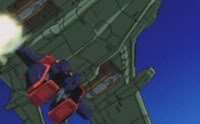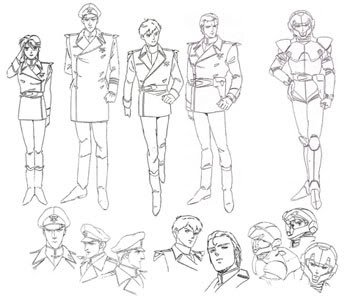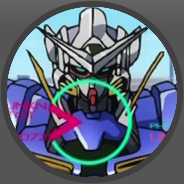03.25Rules
:: Intro
Hello, and welcome to Future Imperfect: New Era. Please read these rules with care, whether you’re a returning veteran, or a complete newbie– FI:NE has many paths for you to choose, and knowing what you’re capable of doing is important to helping pick the right one.
The concept and initial writings of these Rules were by Troika, while some cleanup, revisions, and formatting was by Vlad.
This RPG follows the legacy of a number of games before it: Gundam Pilot and Gundam Cataclysm, run by Rob, and of the recent Future Imperfect as well. Welcome back, pilot… we missed you.
Future Imperfect: New Era is a play-by-email role-playing game. What this means is that you send in your character’s actions via email, and then the admins and battle writers deal with the results of these. Simple enough, right? In practice yes, but there is quite a bit in the way of rules that govern which actions you can take, and so forth, and so on. It looks complex, but for the most part, it’s not. Read on, everything should be fairly sensible.
:: Code of Conduct 
These are some basic rules of interaction that will help grease the gears of society, so to speak. Follow these at all times.
1. Be respectful to the staff. They spend time and effort to run this game for everyone, after all (especially Vlad!).
2. Be respectful to other players. No one likes a jerk. Role-playing a jerk, of course, is just fine – we won’t (usually) judge based on how much of a prick your character is.
3. Multiple player characters are strictly forbidden. You may role-play other characters, but you may have only one character on the roster.
4. Follow the rules of the forums and the chat; both are available in the relevant places.
If you don’t follow the rules, you’ll make Penny sad… and what kind of horrible person makes a penguin sad?
:: When to E-Mail, when we run, and when we update
Future Imperfect: New Era runs from Monday to Thursday, with the RPG being paused on Friday, Saturday, and Sunday for joining, site maintenance, and salaries. The email deadline is 6:00 PM Central Time. Emails after this deadline will not be accepted unless there are extenuating circumstances of which we have been given notice in advance. Updates will usually be posted by 12:00 AM Central Time, although these have been known to take longer. Large events tend to transpire on Thursdays, so a Thursday update may not go online until the weekend in order to get everything finished. If an update hasn’t been posted by the usual time, the Chat Room is the best place to inquire as to its whereabouts.
The email address for the RPG is FINewerarpg@yahoo.com. Please direct all actions to this address, and title them appropriately: for example, if you’re moving somewhere, put “Moving” or “Move” or some such in the title. If you’re attacking someone, put “Ambush” and so on and so forth. If you are doing multiple actions in a single update, please send multiple emails so that they can be filtered into the appropriate folders properly. Likewise, be sure to put your character name and MS name in the subject, preferably before the name of the action so that we can more quickly process the emails come update time.
:: Actions
Future Imperfect: New Era has many things you may do, most of them combat related. These are detailed below.
 Ambush: The bread and meat of any RPG, this is fairly simple. You, or possibly you and several others, will waylay an individual, thus gaining an advantage in combat over them. Usually you will deal more damage than you take, but this isn’t always guaranteed. Rewards are low, but the risk is minimal to you. Only player characters may be ambushed. This action may be used after movement– see the Movement section for details. Players may not be ambushed when in bases or aboard ships, although you can always attempt to attack the base or ship itself. You may, at your option, attempt to capture a player during an ambush; this will require a ship. Further rules below.
Ambush: The bread and meat of any RPG, this is fairly simple. You, or possibly you and several others, will waylay an individual, thus gaining an advantage in combat over them. Usually you will deal more damage than you take, but this isn’t always guaranteed. Rewards are low, but the risk is minimal to you. Only player characters may be ambushed. This action may be used after movement– see the Movement section for details. Players may not be ambushed when in bases or aboard ships, although you can always attempt to attack the base or ship itself. You may, at your option, attempt to capture a player during an ambush; this will require a ship. Further rules below.
 Blackout: Similar to an Ambush, this represents you firing a few quick shots at maximum range and then running away. Minimal damage and rewards, but also no risk whatsoever for the attacker. Only player characters may be ambushed. This action may be used after movement– see the Movement section below for details. Players may not be blacked out when in bases or aboard ships.
Blackout: Similar to an Ambush, this represents you firing a few quick shots at maximum range and then running away. Minimal damage and rewards, but also no risk whatsoever for the attacker. Only player characters may be ambushed. This action may be used after movement– see the Movement section below for details. Players may not be blacked out when in bases or aboard ships.
 Spar: A friendly little action between two or more players, simply a test of skill with beam weapons on reduced power and paint ammunition loaded into solid projectiles. Rewards and damage are both low. You may not spend any AP (see below) before a sparring action on that update, e.g. you must usually be at the same location as the other player. Sparring is usually not allowed inside ships or bases.
Spar: A friendly little action between two or more players, simply a test of skill with beam weapons on reduced power and paint ammunition loaded into solid projectiles. Rewards and damage are both low. You may not spend any AP (see below) before a sparring action on that update, e.g. you must usually be at the same location as the other player. Sparring is usually not allowed inside ships or bases.
 Duel: A duel is when two fighting spirits collide! Two player characters will go all out, attempting to defeat the other and establish their supremacy. Be warned, however, that this is dangerous: damage, injury, and possibly even death can result from a duel. However, the rewards are equal to the risk. You may not spend any AP (see below) before a dueling action on that update, e.g. you must usually be at the same location as the other player. Dueling is definitely not allowed inside ships or bases, and will often result in serious consequences for the infraction.
Duel: A duel is when two fighting spirits collide! Two player characters will go all out, attempting to defeat the other and establish their supremacy. Be warned, however, that this is dangerous: damage, injury, and possibly even death can result from a duel. However, the rewards are equal to the risk. You may not spend any AP (see below) before a dueling action on that update, e.g. you must usually be at the same location as the other player. Dueling is definitely not allowed inside ships or bases, and will often result in serious consequences for the infraction.
Brawl: A multi-person duel, these are essentially small free-for-all melees, and carry the same risks, rewards, and limitations of a duel.
 Assault: You, or possibly, you and several others, will assault a base or a ship, attempting to destroy or capture it (a ship is required for the latter; see the Ships and Fleets section below for more details on this). This is a high risk action, especially for inexperienced characters, and a good battle plan is highly recommended! However, the rewards can be great… though don’t expect to get on particularly well with the owners of your target in the future.
Assault: You, or possibly, you and several others, will assault a base or a ship, attempting to destroy or capture it (a ship is required for the latter; see the Ships and Fleets section below for more details on this). This is a high risk action, especially for inexperienced characters, and a good battle plan is highly recommended! However, the rewards can be great… though don’t expect to get on particularly well with the owners of your target in the future.
 Death Match: Making a return from Gundam Cataclysm, this action is similar to a duel, but one person is certain to end up dead. A death match may only have two players participating– and the loser faces dire consequences: in addition to dying, they also lose 25% of their VP. The winner gains an additional 10 VP above and beyond the regular award for winning a duel. Players may only engage in a death match if they have at least 50 VP. Death matches are a serious matter and should not be engaged in for frivolous reasons. Someone’s coming back in a box!
Death Match: Making a return from Gundam Cataclysm, this action is similar to a duel, but one person is certain to end up dead. A death match may only have two players participating– and the loser faces dire consequences: in addition to dying, they also lose 25% of their VP. The winner gains an additional 10 VP above and beyond the regular award for winning a duel. Players may only engage in a death match if they have at least 50 VP. Death matches are a serious matter and should not be engaged in for frivolous reasons. Someone’s coming back in a box!
 Patrol: You attempt to root out any players or ships hiding in a particular region.This action may be used after movement. The first person or ship detected will be ambushed. What this does, essentially, is force a new stealth roll for everyone hiding out in the region, and multiple players patrolling increase the effects! If multiple people are patrolling and multiple detections are made, attacks are made in the order of detection. You may patrol for an individual player if you’re pretty sure they’re in that province, which increases your chance of detection, but you may not patrol while damaged.
Patrol: You attempt to root out any players or ships hiding in a particular region.This action may be used after movement. The first person or ship detected will be ambushed. What this does, essentially, is force a new stealth roll for everyone hiding out in the region, and multiple players patrolling increase the effects! If multiple people are patrolling and multiple detections are made, attacks are made in the order of detection. You may patrol for an individual player if you’re pretty sure they’re in that province, which increases your chance of detection, but you may not patrol while damaged.
 Purchase: You purchase an item from a base, or perhaps purchase additional defenses for a base that you own. You must be in the relevant location to do this. All purchases appear at the end of the update for the day. If you need to buy new items for a base while you are on another planet or some other barren area (and there are no alternate means of procurement available), they can be purchased as normal, but must be delivered before use (a ship or small fleet, depending on the number of things purchased, will appear on the relevant page and move to the base location). Note that these vessels -can- be intercepted by enemies! In the event of such an attack, the purchased mobile suits will be cargo, rather than defenders, and cannot launch to attack. Purchase convoys may be escorted by players. Please include your math in your purchase email, including your starting and ending cash total!
Purchase: You purchase an item from a base, or perhaps purchase additional defenses for a base that you own. You must be in the relevant location to do this. All purchases appear at the end of the update for the day. If you need to buy new items for a base while you are on another planet or some other barren area (and there are no alternate means of procurement available), they can be purchased as normal, but must be delivered before use (a ship or small fleet, depending on the number of things purchased, will appear on the relevant page and move to the base location). Note that these vessels -can- be intercepted by enemies! In the event of such an attack, the purchased mobile suits will be cargo, rather than defenders, and cannot launch to attack. Purchase convoys may be escorted by players. Please include your math in your purchase email, including your starting and ending cash total!
 Construct: You order construction of a new base. The amount of time taken will be based on the size of the base; please see the SimBase™ rules in the shop for more details. You do not need to remain at the construction site while the base is under construction, although it does help in preventing a third party from assuming new management of your facility. As with the Purchase action, constructing a base on another planet or some other barren area necessitates the transportation of the base’s supplies and infrastructure from a developed area and uses the same rules described above.
Construct: You order construction of a new base. The amount of time taken will be based on the size of the base; please see the SimBase™ rules in the shop for more details. You do not need to remain at the construction site while the base is under construction, although it does help in preventing a third party from assuming new management of your facility. As with the Purchase action, constructing a base on another planet or some other barren area necessitates the transportation of the base’s supplies and infrastructure from a developed area and uses the same rules described above.
 Sneak: Normally, only Rogues may make this action. Sneaking allows you to hide from enemy patrols and observations, which may well be the only way to safely get through a very well-guarded area. Sneaking consumes both of your AP for the day, so you may only move once, but the benefits in “not getting shot up” are undeniable. Sneaking can typically only be done on planets or in debris fields and shoal zones in space.
Sneak: Normally, only Rogues may make this action. Sneaking allows you to hide from enemy patrols and observations, which may well be the only way to safely get through a very well-guarded area. Sneaking consumes both of your AP for the day, so you may only move once, but the benefits in “not getting shot up” are undeniable. Sneaking can typically only be done on planets or in debris fields and shoal zones in space.
 Piracy: Only Rogues with a ship at their disposal may perform this action. You attempt to raid some of the civilian (or possibly not-so-civilian) shipping in the area. Rewards will be in the form of goods that can be sold at certain bases, as well as potentially useful equipment and information (determined randomly). Piracy is potentially very profitable, but reduces relations with the victims, and may prompt retaliation from interested parties. Piracy actions may be performed on fleets transporting mobile suits to player-owned bases on other planets, provided the attackers have enough room to store some or all of the pilfered mobile suits. Larger ships can generally store more goods, but any vessel that can carry mobile suits can usually store up to four units of stolen cargo in the hangar space that would normally be used for mobile suits.
Piracy: Only Rogues with a ship at their disposal may perform this action. You attempt to raid some of the civilian (or possibly not-so-civilian) shipping in the area. Rewards will be in the form of goods that can be sold at certain bases, as well as potentially useful equipment and information (determined randomly). Piracy is potentially very profitable, but reduces relations with the victims, and may prompt retaliation from interested parties. Piracy actions may be performed on fleets transporting mobile suits to player-owned bases on other planets, provided the attackers have enough room to store some or all of the pilfered mobile suits. Larger ships can generally store more goods, but any vessel that can carry mobile suits can usually store up to four units of stolen cargo in the hangar space that would normally be used for mobile suits.
 Mission: The powers that be, including other players, may issue mission requests where a contractor (you) is called on to perform some task. These may be listed on the Missions Board, or come about through role-playing. In any case, typically speaking conditions and any applicable reward will be posted or made available. When performing a Mission action, make sure to specify if anyone else is participating in the operation, otherwise multiple people working on the same job will be assumed to be in competition with one another…
Mission: The powers that be, including other players, may issue mission requests where a contractor (you) is called on to perform some task. These may be listed on the Missions Board, or come about through role-playing. In any case, typically speaking conditions and any applicable reward will be posted or made available. When performing a Mission action, make sure to specify if anyone else is participating in the operation, otherwise multiple people working on the same job will be assumed to be in competition with one another…
 Recon: You attempt, through various means, to uncover information about a base on the Installations page. Specify your tactics and methods in your email, as a sound strategy could be the difference between getting away undetected and winding up in a prison cell! What you learn, if anything, will be revealed via Private Message on the forums – the intelligence is yours to do with as you wish. The methods used for recon vary widely – you can even choose not to use your mobile suit at all. VP awards are also very variable, and are primarily contingent on the level of success of the operation.
Recon: You attempt, through various means, to uncover information about a base on the Installations page. Specify your tactics and methods in your email, as a sound strategy could be the difference between getting away undetected and winding up in a prison cell! What you learn, if anything, will be revealed via Private Message on the forums – the intelligence is yours to do with as you wish. The methods used for recon vary widely – you can even choose not to use your mobile suit at all. VP awards are also very variable, and are primarily contingent on the level of success of the operation.
You may also recon an area, to determine what kind of shipping (military or otherwise) is passing through it.
:: Movement
Movement is done via Action Points, or AP. A player receives two AP per day, and unspent AP do not carry over into the next update. Most actions, and their AP cost, are listed below.
|
Cross a border on a planet:
|
1 AP |
|
Attack actions:
|
1 AP |
|
Enter a friendly base/ship:
|
1 AP |
|
Leave a friendly base/ship:
|
0 AP |
|
Normal movement in space:
|
2 AP |
|
Purchase:
|
0 AP |
|
Transfer funds:
|
0 AP
|
|
Hide location on roster:
|
0 AP
|
|
Enter planetary orbit:
|
1 AP
|
|
Begin atmospheric re-entry:
|
1 AP
|
Ships utilize the same movement system as players. Certain ships may speed travel somewhat; consult the shops for more details on this. Note that you cannot use a ship to increase your own movement, although you can use it to extend the reach of your attack actions.
Attacks have priority over movement, so if you send in a move action and are attacked the same day, your move is interrupted. You may not move after engaging in combat, which can be a powerful tool in restricting the ability of enemies to act.
If you move onto a base/ship the same day it engages in battle (whether attacking or defending) you may participate in the battle.
:: Movement To and From Earth (and select other planets)
A few special circumstances apply towards players who are attempting to enter or leave Earth – this is primarily the result of the perils involved in atmospheric re-entry as well as escaping planetary gravity.
Going to Space: While certain mobile weapons and ships are capable of reaching escape velocity by their own means, the majority require assistance to break the gravitational forces pulling down their machines (and souls, depending on whom is asked). Typically speaking, placing yourself in Earth Orbit requires the use of a spaceport of some kind, where your mobile weapon will be hefted into space via a Heavy Lift Vehicle (H.L.V.), a large-scale cargo shuttle, or perhaps simply attached to a mass driver and fired up on its own volition, depending on the available facilities. Ships that are capable of acting in space can be launched from a spaceport as well, although only facilities also equipped with an appropriate Dock Facility – or an Earth Union Cosmoport – can also accommodate launches of this type. If a spaceport charges a fee for use of their facilities, it will be listed on the installation’s page.
Coming Back Down: Leaving the grasp of a planet might seem daunting, but the truth of the matter is that returning to whence you came is the more difficult part. Again, some mobile weapons and ships can perform atmospheric re-entry of their own volition, but the majority require some additional parts and components to do the job. Typically speaking, this is accomplished by coordination with a ground-side spaceport in a reverse version of heading up – the spaceport which you are heading to provides the necessary parts via unmanned launch into orbit, where your ship or mobile weapon collects them and sets a course to arrive at that facility. Alternatively, you may also purchase a ballute pack of your own choosing before arrival in Earth Orbit, which allows a mobile weapon to survive re-entry on its own. The advantage towards “do-it-yourself planetfall” is that you can also choose to land in any territory you please, and could theoretically even attack an unfriendly base via this means, although this possesses certain perils as well.
Complications: Space launch and return is a fairly pedestrian activity by the UC 240s, with only occasional accidents/catastrophes worldwide. However, the potential for hazards and danger exists – statistically speaking, it is significantly more likely to come as a result of “deliberate human interaction”, e.g. being attacked. A catastrophic explosion aboard an HLV – which are really little more than portable hangars full of rocket fuel – can be extremely fatal, while coming under bombardment during an atmospheric approach vector has problems of its own. In addition to the possibility of being forced into a deeper approach path where you might be vaporized, you could also be knocked off-course – if you come under attack while making a re-entry action, there’s a percentage that you may end up landing in a different territory than you intended.
:: Stealth
Rogues have the unique advantage of not appearing on the map when moving – usually. Their locations are invisible to all but themselves, so don’t forget where you are!
However, stealth isn’t perfect. It’s possible for you to be unlucky (or dumb) and be revealed, based on the table below, which is a simple roll on a 100-sided die (often Vlad’s Zocchihedron) by the relevant staff member. This roll is made for every territory on Earth, the local Earth-Moon region, and select other planets a Rogue player moves through. Stealth is not applicable in space except in shoal zones and debris fields, while fleets are automatically revealed on the roster and may not take advantage of stealth regardless of who owns them. A number of conditional modifiers apply to a stealth roll, most of which are listed below.
|
Infiltrator is a single mobile weapon
|
+50 |
|
Infiltrator is an over-sized mobile suit or a mobile armor
|
-25 |
|
Multiple players or ships simultaneously moving through the same area:
|
+10 |
|
Infiltrator has an optical stealth system:
|
+20 |
|
Infiltrator using the Sneak action:
|
+20 |
|
Infiltrator is a ship or on a ship:
|
-20* |
|
Infiltrator is a submarine or on a submarine which has dived in an ocean sector:
|
+20
|
|
A single enemy is patrolling in the same sector:
|
-30
|
|
Additional enemies patrolling in the same sector (cumulative):
|
-10
|
|
Patrolling enemies have advanced sensors (cumulative):
|
-10 |
|
Hostile base in the sector has an Advanced Sensor Array:
|
-10 |
|
An enemy ship is patrolling in the area:
|
-20 |
| Enemy mobile suits aboard that ship are also patrolling (cumulative): | -10 |
|
Patrolling enemies have advanced sensors (cumulative):
|
-10 |
|
Infiltrator is moving through an ocean sector:
|
+10 |
|
An enemy fleet is patrolling in the area:
|
-50* |
|
Infiltrator is attempting atmospheric re-entry:
|
-30 |
|
Infiltrator is a ship or on a ship attempting atmospheric re-entry:
|
-50 |
|
Infiltrator is moving through a sector with a Security Rating (per point):
|
-10 |
|
Infiltrator is attacking a ship, fleet, or base, including Piracy actions:
|
-100 |
|
Infiltrator is attacking another player:
|
-50 |
|
Infiltrator is blacking out another player:
|
-25 |
|
Patrolling enemy seeks specific infiltrator:
|
-25 |
*This value may fluctuate wildly based on the relative size of the ship or fleet
In the event that a roll results in a natural 100, the infiltration is an automatic success – inversely, a natural 1 is an automatic failure, and usually something bad happens to boot.
Failing a stealth roll will reveal you on the roster until the end of the next update, and depending on circumstances, may result in a visit from local authorities bearing weapons and intent to use them. If you happen to be imprisoned, your location is usually revealed automatically for the duration of the sentence.
If revealed, a rogue player can use the Hide action to secret away their location again. This can be paired with the Sneak action as well to give the player the best possible chance of avoiding re-detection and pursuit.
You may choose to reveal your location at any time if you desire to do so.
Normally, ships cannot passively use the Hide action. However, they can conceal their location by using the Sneak action – this represents using a variety of large-scale subterfuges which can render a vessel less detectable, although the ship’s travel speed suffers as a result. However, submarines may use the stealth rules, regardless of faction, so long as they do not take damage that prevents them from diving – a surfaced submarine is considered a ship as normal. Submarines are essentially treated as if they are rogue players in this case, meaning they do not incur the customary -20 penalty for being a ship, except in the case of not being able to submerge due to damage.
:: Interplanetary Movement
Movement between planets may only be accomplished with the aid of a properly-equipped ship with an interplanetary sailing unit; the distances involved are far too large for almost any mobile suit to cross without running out of fuel or life support for the pilot.
If you are unlucky enough to have your method of transportation taken away during interplanetary travel, and aren’t lucky enough to be blown up along with it, you have four updates to come up with a solution before life support expires and your character goes with it. Nobody ever said transit of outer space wasn’t perilous!
You do not need a ship to move within the Earth/Moon system and amongst the Lagrangian points, as sufficient infrastructure (cargo ships, stations, etc) exist to allow one to move about without as many logistical concerns.
The amount of time it takes to move between planets is shown on the Maps page.
:: Security Ratings
Certain areas, especially Earth Union territories (as well as some territories owned by other organizations, and perhaps player organizations as well) have Security Ratings. This represents, in a rough sense, how ‘secure’ an area is kept against potential troublemakers. It affects the likelihood of being revealed on the roster when you pass through the area, as well as the severity of additional response/retaliation from bases and ships. Obviously, security ratings are only relevant towards characters with negative Reputation towards the proprietors.
:: Purchasing and money transfer
Buying things is fairly simple, assuming you have enough funds available for the item in question. Earth Union players can make most purchases from any Union-owned base, while Rogues have to be at a base selling the items in question – inventory is usually listed on the relevant Installations sub-page. Note that only public bases show shops, and private ones may have shops of their own – membership benefits of a sort.
Transferring funds is an easy way for multiple players to pool resources, often a necessary step for making a large purchase. Players may only send or receive funds once per update – teams have greater account flexibility, and are not subject to this limitation. Think about forming one if you’ve got a lot of book-cooking to do.
Credits and Requisition can only be used to purchase items with a cost listed in those denominations, and while Union and Rogue players will usually not come into possession of the other side’s resource, no prohibitions on spending the wayward currency are in place.
Upgrades, defenses, and garrison forces for a base can only be bought if the buyer is in the same region as the base. Likewise, you may not remotely purchase items for ships or a fleet, or remotely purchase ships (if you are Earth Union).
When making a purchase order or constructing a base, please perform the mathematics in your E-mail order. This is for the staff’s benefit in making sure that all computations have been conducted properly so that you aren’t paying too much (or too little…) for your new purchases. Failing to include an itemized cost list in your purchase request may result in the staff pretending we didn’t see the e-mail.
:: Ships and Fleets
Ship Combat
Ships are capable of most of the same combat actions as players, and due to the greater capability of a crewed vessel and its facilities, are also the only effective way to capture other ships or players in the field.
Ships may not conduct blackout, duel, or match actions, due to the specialized nature of those combats being oriented at mobile suit battles.
A player not on a team may use no more than two of their ships in combat simultaneously (and only in the same combat). They may also not form or join fleets. A player must be aboard at least one of the ships involved in such an action, and likewise must be aboard their ship for single ship actions (not as the captain; you merely need be present at the battle, though you must -start- it aboard the ship).
Ship Movement
Ships utilize the same movement system as players, but certain versions may have speed modifiers; check the shops for details. Ships owned by Rogues may gain the Rogue stealth bonus, although they must normally use the Sneak action to take full use of it. A ship uses the same AP system for movement as players themselves do. Embarked players on a ship do not consume their own AP while the ship is moving, but cannot disembark and then make further movement actions on the same update.
Some ships – typically those with conventional power plants, or space craft that can fly in atmosphere – require fuel to move. Vessels with this limitation will receive a Fuel: entry on the Ships page, which will be incrementally lowered for each AP used. A ship is refueled when docking at any friendly base with a Dock Facility or Airfield, depending on the type of vessel in question. Running out of fuel in the field can range from simply grinding to a halt or falling out of the air like a rock – in any event, it’s something to be avoided.
Ship Damage
Ships can absorb much more damage than any mobile suit, and while this makes them significantly harder to destroy, significant damage cannot be repaired in the field as mobile suits can. If a ship sustains damage to specific areas – as noted in its status description – these must be repaired at a base with the relevant docking and repair facilities. Depending on the base owner’s relationship with ship’s owner, repairs may incur charges and fees, which are charged upon completion of the work.
When drydocked and berthed for repairs, a ship’s various maladies will be reduced in order of severity, which will usually require multiple updates. The ship’s status will reflect what damage remains if repair work needs to be postponed during this process. When partially dismantled and in the midst of overhauling, a ship may be vulnerable to enemy attacks that befall the base, depending on the nature of the dock facility. Fully repaired or undamaged ships that are moored at a dock facility can be attacked as well, although unlike a gutted vessel being serviced, those can actually shoot back.
A damaged ship can be attacked in the field, so if your ship has had its main armament shot off, procrastinating on repair work could prove catastrophic!
Capturing Ships
Seizing control of a ship can be a significantly more daunting prospect than a base, as appropriate force must be exerted to force the ship to surrender without destroying it outright. More importantly, a ship fighting to the death offers much less room for error than a base does.
Hoisting the White Flag: To capture a ship, it can either be forced to surrender via threat of destruction, or against particularly motivated crews, boarding parties must be sent over to exterminate resistance. The latter may result in the ship’s crew being killed, in which case it reverts to Level 1 in terms of experience to reflect new press-ganged crew members being hired on. Whether or not a ship can be captured based on being defeated in combat and ordered to surrender is entirely situational. In either case, the enemy ship must be sufficiently crippled to enable a realistic threat or permit the shuttles of boarding parties to not be shot to pieces en route.
Much like capturing a player, a ship is typically required to capture another vessel, although certain circumstances could exist where this would not be necessary.
Send the Marines: The difficulty of capturing a ship can also vary greatly based on the type of vessel that is to be seized. Smaller ships are typically easier to steal than larger ones, and the environmental type of the craft plays a significant factor as well. Land battleships are the most simple to capture, since shooting out their engines typically causes them to simply stop where they are. Naval vessels are somewhat more difficult, as they must be disabled without being sunk – crippling a ship’s systems without compromising its hull can be a tricky prospect. Submarines follow much the same concept, except they must be forced to surface first, which adds another layer of difficulty. Airborne targets are likely the most challenging, as forcing one to land without setting it on fire or inflicting damage that would negate its airworthiness is less than a simple endeavor. If a ship is docked at a base while the base is being captured, the ship could be captured as well. This is a highly situational variable, although the attacking party must still have a ship to affect the capture operation. A ship that is simply moored at a base will have a much better chance of getting away than one that is currently being repaired.
Personal Marinas: Each player may own up to three ships at a time, while teams have no restrictions on how big their vessel arsenals may be. A ship can also be abandoned by a player – this action might be necessary if the player exceeds their total ship allowance, or if a ship is badly damaged while capturing another and cannot be reliably moved to a base to receive repairs. In this event, the crew can be transferred to another ship provided it is at the same location. An abandoned ship can be seized by other players, but can’t be used for any combat-related actions until taken to a base to receive a new crew.
Second Happiest Day of Your Life: Ships can generally be sold for around half their value at any public base with the relevant docking facilities. A damaged ship’s resale value may be reduced, so it is generally a better idea to have it repaired before attempting a sale. Even at bases that charge fees for repairs, the difference will still usually be in the seller’s favor if the ship has been restored to full combat condition first.
Ships and over-sized units 
The hangar capacity of most ships is given assuming a fairly standard size – to wit, very large units occupy more space. As a general rule of thumb, mobile armors and mobile suits equipped with sub-flight lifters or other large performance-enhancing hardware occupy two or more spots of a ship’s hangar capacity. A very large mobile suit, such as a Gabull, simply takes up the space ordinarily occupied by two standard-size units, while giant weapons like a Psyco Gundam (see illustration on right) must be stored externally – in that event, the two space loss is assumed to be the result of mooring gear and other apparatuses required to haul the given monstrosity along. Externally transporting a large unit could result in a marginal but noticeable impairment to speed or combat ability, depending on its overall size.
Ships that cannot store at least six mobile suits usually cannot store over-sized units.
Ships and patrols
Ships are much more effective than individual players than patrolling, and, in addition to getting a detection bonus, also get a further bonus based on the number of onboard mobile suits; see the stealth table for further details.
:: Fleets
Fleets are the exclusive providence of player teams. To form a fleet, all that need happen is that all the players involved send in an email. All ships involved must be team property, and the fleet is controlled by the team leader or his second.
A fleet must have all ships in the same location before it can form. Fleets between vessels that operate in different environments may not be created (eg you may not group a submarine with an aircraft or an aircraft with a spacecraft, but you may group a submarine with conventional naval vessels).
A patrolling fleet is one of the most effective ways to interdict people from passing through an area and gains a great bonus to detection. Furthermore, multiple players may be interdicted simultaneously by the fleet; each mobile suit carried by the fleet and each ship gets it’s own roll to detect trespassers! Fleets are bad news for the sneaky.
Fleets have the same amount of AP as a player with regards to movement.
:: Role-Playing
Role-playing is the heart of any RPG (what do you think the “R” and “P” stand for?). Your character’s thoughts, motivations, and their relations to others can be played out on our Role-Playing Board. Make sure your Pilot’s Profile is posted to the Profile Board first so that other players and staff have a good idea of where you’re coming from and how your role-plays are derived from your background. You may also wish to link your posts to your profile as well to create a handy reference for the battle writers.
Role-playing isn’t just for interacting with other players. You can also interact with the world around you, and the characters in it. You may also be able to do things for factions and governments, and be rewarded accordingly.
There are a few guidelines for role-playing, try and stick to these throughout your posting.
1. Don’t “metagame” – references or knowledge that your pilot would have no awareness of shouldn’t be deployed on the role-playing board, either explicitly or in allusion.
2. Don’t “god mode” – generally speaking it’s bad form to place your pilot in situations or circumstances that they can’t be in, such as the leader of a faction or a world-renowned hero (unless they actually are, of course). Likewise, don’t try to control or make decisions for other players unless it’s through means your pilot would have access to.
3. Stay in-character - the role-playing board is meant exclusively for posts pertinent to your pilot and their interaction with themselves and the world around them. Anything not having to do with that subject should be posted elsewhere.
Role-playing actually isn’t required to play the game. However, it has been scientifically proven in clinical trials that players who role-play and do so often tend to accomplish greater feats, live longer, and generally enjoy a more fulfilling experience during the run of any Gundam RPG. Having a fleshed-out character and frequent insights into his or her situations helps the battle writers deploy them properly, employ correct tactics, and generally make it that it’s your character – not just your mobile suit – on the field.
:: Reputation
Reputation is a rough representation of how well-liked – or disliked – a player is with regards toward a particular faction. A player who cultivates an excellent long-term relationship with a faction may be rewarded with special perks and prizes, such as an increased salary, access to facilities and bases that are normally private, and perhaps even offers to sell special or prototype weapons not normally found in shops. Conversely, developing a poor Reputation with a faction could result in a bounty being placed on the offending character, loss of access to public facilities and shops, and even hit squads being sent out on official business to deep six the irritant.
Give and Take: Developing Reputation with factions is done primarily via accepting and completing Missions or other jobs for that group. Role-playing can also affect changes on Reputation as well, although this is best performed in conjunction with the former. Be advised that getting close and comfortable with a given faction might result in changes to the player’s Reputation with other factions, especially those that the faction already has a negative relationship with. Reputation is recorded in a post appended to each player’s pilot profile on the Profile Board, and will be updated each day that the player’s Reputation changes. Earth Union and Rogue players both start with different starting Reputations – check the factions section for more details.
In the case of player-run Teams, Reputation is aggregated from the individual Reputations of each member. This means that accepting a new member with a very pronounced Reputation with one faction adjusts the entire Team’s Reputation accordingly, so take care in who you let in!
:: Veteran Points, Experience, and so forth 
Your general competence behind the controls of your mobile weapon is measured via VP, or Veteran Points. The more VP you have, generally the more experienced and proficient you are. VP is not, however, an absolute determinant of skill, and your mobile weapon’s mechanical ability as well as situational variables can give advantages of their own.
Veteran Points gained from different types of battles vary widely. A general average is posted here, although the gains could be higher or lower depending on the exact battle.
* Blackout: 3 VP
* Spar: 4 VP
* Ambush: 6 VP
* Duel: 10 VP
* Events and missions: Varies
You may also receive VP for role-playing or for certain other things.
:: Damage and Injury 
Violence between apartment building-sized war machines that weigh many tons will, sooner or later, result in things getting broken. “Damage” is a rough aggregate of combat-related maladies that befall player-owned mobile suits during battles, and is expressed as a number of days that will be required before your machine is up and running at full capacity again. Damage will be posted after any relevant battle a player partakes in, and will modify the player’s Status: entry accordingly. The maximum damage a mobile weapon can sustain is four days’ worth – damage beyond this causes the destruction of the mobile weapon.
Fixing What’s Broke: There are two standard ways to remove Damage.
The preferred method is to wait for repairs to complete automatically – the amount of updates (days) remaining for this is noted in the damaged player’s Status. You may move while damaged, but not partake in most other actions that have an AP cost, including attacks, Patrol, Piracy, and so forth. While you yourself cannot be attacked while damaged, you can be captured, so keep a close eye on where enemy ships might be.
If you can’t wait, you can instead make a Hasty Repair action. This is not a repair in the genuine sense, but rather a jury-rigging job to make your mobile weapon combat-worthy in spite of its condition. Making a Hasty Repair action allows you to take attack actions, and defend yourself from being captured, when you would otherwise not be allowed to. You must cancel the Hasty Repair in order to begin repairing normally, and if damaged again, you may not make a second Hasty Repair action under protest from the mobile weapon’s already hindered systems. Fighting while under a Hasty Repair is a less-than-ideal situation, and various functions of the mobile weapon may be inoperable depending on how much damage has already been inflicted. Be careful!
If your mobile weapon has been destroyed, but your pilot hasn’t, consider yourself lucky! A destroyed mobile weapon is similar to having the maximum possible damage, except damage does not begin to be repaired until you travel to a friendly base – it then begins to be ticked-down as usual. Likewise, you cannot make a Hasty Repair action, as there’s simply not enough left to repair. Alternatively, instead of beginning reconstruction of your destroyed mobile weapon, you may also – before repairs begin – choose to switch to another mobile weapon as though it was an end-of-the-month change weekend, with all the usual effects.
:: Injuries
The pilot of a mobile weapon can sustain damage just like his chariot can, although this is much less common. A cockpit is usually pressurized, climate-controlled, waterproof, gas-proof, and generally a safe place to be compared to standing out in the open during a mobile suit battle, but sometimes parts of the battle work their way in, usually with unpleasant results. A player may suffer injuries that require up to eight days to heal, during which time their available actions are extremely limited. An injured pilot may not make any attack, purchase, funds transfer, or movement actions, although a friendly (or unfriendly!) ship can pick them up. Some particularly severe injuries won’t go away if the player is in a location that lacks any kind of medical facilities, such as deep space or an unpopulated planet. The frontiers of the solar system can be a dangerous place – go without a friend at your peril!
Role-playing the effects of injuries on the hurt character is not mandatory, but can earn Veteran Points at a time where most other options are closed. Once the injury is fully healed, the character is free to act normally again. Depending on the nature of the trauma received, the player might be left with a few mementos of the occasion – these might include visible scars, regenerated tissue or limbs, or bionic prosthesis, depending on the exact situation.
:: Death
Mobile suit warfare can be extremely perilous, and getting a beam saber through the cockpit is not out of the question. Death of a player character can come in a variety of ways – the player can be mortally wounded or killed outright by a lucky hit, totally torn to atoms by a catastrophic mobile suit explosion, or even pressed against a wall and shot by a particularly infuriated captor. Regardless of the method of action, death is a permanent and final condition from which there is no reprieve.
“Now what?”: While your character may have expired, you can choose to continue playing the game with a new character at your discretion. Creating a new pilot removes you from the game for a week, as well as resets Reputation and any related conditions that may have arisen. Owned property is lost (though this may be “willed” to other players at your discretion, assuming they are allowed to possess it), but the new character may retain the predecessor’s Veteran Points, funds, and upgrades at the player’s discretion. A mobile weapon switch can also be affected at this point, although the down-time for the switch compounds the time which the player is removed from the game for the death in the first place, meaning up to two weeks of total “vacation” could result. You may respawn at any valid location for your alignment (eg an EU player could spawn in any EU territory, a Rogue player could spawn on the Moon or South America or some such, and so forth). Your new location will be hidden until you respawn (and afterwards, if you’re a Rogue in a location where stealth rules apply).
:: Upgrades 
As with most Gundam RPGs before it, Future Imperfect: New Era follows the “mid-series upgrade” trope to a point. On acquisition of a certain number of Veteran Points, each player becomes eligible to receive an Upgrade of their current mobile weapon. Upgrades are extraordinarily varied and run the gamut of mechanical and technical ability.
Fixing What Isn’t Broken: Acquiring an Upgrade takes a week of down time, which represents the locating or fabrication of the machine and your pilot’s adaptation and training with it. Players cannot make any actions during the Upgrading process, so it’s a generally good idea to be somewhere safe before beginning it. Most players will qualify for an Upgrade at or around 100 Veteran Points, although this is purely a guideline – smaller Upgrades might be available sooner, while more powerful ones could take longer to present themselves. Either way, you’ll know when it’s ready.
The New Ride: An Upgrade can take a variety of forms – the most important determinant is the base mobile weapon being Upgraded. An Upgrade could be an entirely new mobile suit, usually a logical follow-on design to the base model, an overhaul or modification to the base weapon to increase its abilities or handling, or even an entirely custom design created by the player via his associations and allies in the game world. The only constant is that the Upgrade will offer a significant improvement in combat ability over its predecessor.
:: Captured 
In particularly unfortunate circumstances, a player may find themselves cornered by the enemy with no possibility for escape. Instead of a coffin, however, they are rewarded with the interior of a prison cell. This may because of rules of engagement, a desire for information, or simply the capturing party being merciful. Regardless of the method or reasons, being imprisoned is a serious situation.
Breaking the Law: Being incarcerated is a fairly common consequence of a very badly botched attempt to assault a base. When a player’s mobile weapon is shot down over a very angry enemy-held installation, a trip to a five-by-nine box is a high possibility. On the other hand, a player might also be captured in the field – kidnapped might be a more appropriate term – by a motivated enemy in possession of a ship with adequate space. In either case, the unlucky player is more or less at the mercy of their captors. In most situations the player’s mobile weapon is captured along with the pilot, but in unusual circumstances it might be left at the point of capture while the pilot is taken elsewhere. In this event the captured pilot, upon being released or escaping, must return to where they were taken to recover their machine before becoming able to make any combat actions again.
Doing Time: Once behind bars, a player can be held for any period of time. NPC-controlled factions will generally not hold a player for more than eight to twelve updates unless the victim is particularly hated or has a very poor Reputation, at which point he may well never see the light of day again. If the captured player happens to be in the custody of another player, the capturing party has complete discretion on the final disposal of the unfortunate captive. If a captured player believes they have no chance of escape, they may voluntarily choose to “retire” their player to the slammer – in this event, rules for as if the player’s pilot was killed come into effect (see “Now what?” above).
Early Release: Getting out of prison might be easier than getting in, depending on the situation. The captive party may be able to secure an early release by paying a fine of some type, or agreeing to perform a job or mission for their captors. Failure to adhere to the terms of this release may result in a tamper-proof bomb planted in the released party’s mobile weapon being set off. The imprisoned character can always attempt to checkout of their own volition (read: escape), although failed attempts may result in the extension of the player’s sentence. The difficulty in performing a breakout is primarily dependent on the nature of where they are confined – escaping from a ship’s brig or the stockade at a remote outpost is measurably easier than a dedicated prison complex meant to hold renegades, and having outside help can be an enormous boon as well.
Dead Man Walking: The mercy of one’s captors might be a purely hypothetical concept, and a captured player could find themselves being hung or shot if they’ve done exceptionally bad things towards their hosts. In the case of being locked up at an NPC-owned prison, the likelihood of having a capital punishment administered is low for all but the most nefarious prisoners, while guests of other players could receive the “twenty-five cent solution” for almost any reason.
:: Factions
Earth Union 
The self-proclaimed rulers of the world, the Earth Union is a conglomeration consisting primarily of the Earth Sphere Alliance and Human Reform League factions from the first Future Imperfect. While claiming to stand for freedom and individual justice for all, the more cynical have noted that much of the taxes and resources collected by the Earth Union goes to feed its ever-growing military-industrial complex.
The Earth Union is nominally a federal democracy, with member states sending representatives to the Assembly in Bern where legislative action is carried out. The Union is a benevolent if authoritarian state, with a reasonable human rights record. Its citizens enjoy political franchise, universal health care, and a relatively high standard of living, but all are contingent on the completion of compulsory state service, including military, law enforcement, disaster response, or even humble office clerking. Most of Earth’s population, and about three-fifths of humanity as a whole, live within the boundaries of the Union.
Politically speaking, the Earth Union maintains a firm but fair grip on the bulk of Earth’s northern hemisphere, making it easily the largest supranational entity in existence. Although the Union claims to be the representative of the world as a whole, it has little affiliation or interaction with the “global south” due to a combination of blasted environments, less-developed economies, old or inadequate infrastructures, and “politically incompatible” societies.
 The Earth Union Armed Forces represent a very large facet of its state – one could say that they are its largest constituency, largest dependent, and largest earner all at once. The commander-in-chief has a permanent seat on the government’s Federal Council, and retired military officers commonly run for seats in the Federal Assembly. Combined with the inheritance of the Human Reform League’s extremely jingoistic attitudes and limited concern for the well-being of non-citizens, this tends to create a somewhat militaristic society.
The Earth Union Armed Forces represent a very large facet of its state – one could say that they are its largest constituency, largest dependent, and largest earner all at once. The commander-in-chief has a permanent seat on the government’s Federal Council, and retired military officers commonly run for seats in the Federal Assembly. Combined with the inheritance of the Human Reform League’s extremely jingoistic attitudes and limited concern for the well-being of non-citizens, this tends to create a somewhat militaristic society.
Perhaps a one of the key “equalizers” in the Union’s arsenal is the ability to mass produce solar furnaces, more commonly known as a “GN Drive”. These devices allow for the creation of mobile suits and other military weapons of exceptional performance and ability, and the Union jealously guards its virtual monopoly on this precious and mysterious technology. Combined with sophisticated tactical networks and satellite-based observation of the planet, along with crushing economic supremacy, understanding the Union’s political domination becomes easy.
The majority of Earth Union players will be starting off as junior officers under the auspices of the newly formed 431st Counterinsurgency (COIN) Battalion, which is equipped with non-standard mobile suits for the purpose of tracking down and eliminating terrorists, malcontents, and troublemakers, especially those equipped with their own mobile suits. Members of the 431st have wide latitude to requisition and make use of the Union’s military equipment, as well as personal liberties in accomplishing their duties.
Earth Union players do not use stacks of bills or gold bricks to finance their personal collections of hardware, but rather the influence of their rank and station. Each week, Union players are “paid” an amount of Requisition, which represents an aggregate of how much pull that particular player can exert in terms of acquisition of weapon systems. Requisition can be stockpiled like currency, allowing a player to build up favors and network with those in the know, and the weekly allowance increases based on their rank and pay grade.
Earth Union Starting Reputation
Earth Union: 25
All Rogue factions: -10
Rogues 
“Rogue” is a blanket term ascribed to an enormous medley of people, groups, and organizations. Essentially, any armed force that is not a subsidiary of the Earth Union, be it political, ideological, or entirely private in nature, is considered to be Rogue. Some Rogue groups are former factions from the first Future Imperfect game, while others are large corporations and business entities that exist beyond normal government authority, and others still are militant rebel or anarchist groups looking to cause trouble with whomever their stated enemies are. Rogue groups may be friendly, neutral, or actively hostile towards the Earth Union, and some even exist beyond the realm of the general Earth Sphere itself.
A Rogue player begins the game as a free agent, effectively a common man who happens to have an uncommon possession (a mobile suit), and some desire to do something with it. Your ideology, motivations, and goals are entirely your own.
Regardless of affiliation, most Rogues live a life “off the grid”, and tend to be difficult to track down unless they desire a more public appearance. This is represented by Rogues having their location hidden on the Roster page under normal circumstances, allowing them a degree of freedom to skulk about. Consult the stealth rules above for more details and conditions. You may tell your location privately to anyone you wish, of course.
Due to not being a single unified group, Rogue mobile weapons generally tend to be less advanced than the latest Earth Union models, but they have a very wide selection available from many manufacturers and organizations. Some are new models developed in private laboratories, while others are holdovers – and possibly veterans – from the last war.
Rogue players have a salary of 25,000 credits (cr.) per week, which represents foraging, salvage, odd jobs, or possibly “less honest” work such as pyramid schemes or money laundering. Aligning yourself with a larger faction, as well as Piracy actions and stealing ships or bases, can significantly augment and increase your cash flow.
Rogue starting reputation
Earth Union: -25
:: Teams
Players are free to form their own independent groups of mobile suit operators. Creating a team can be an exciting prospect, and it is within these tiny factions that much of the real power of players can be found. Only teams have the power to seize territory, create fleets, and fly their own flag.
Forming a Team: The team’s founder must submit an email containing important information about the new team. Forming a team requires at least three other players to join in, which must be at the same location at the time of the team’s founding, as well as a base or ship to use as a headquarters. A team can include as many members as the founder likes, but new hires must be at the location of the headquarters to join, and there is a maximum limit based on the total mobile weapon capacity of the headquarters itself. The team’s founder is presumed to be its leader, but the founder may designate another member as the leader instead if they desire. The team second in command retains most of the powers of the team leader, with the exception of transferring money from the team account to their own pocket.
Getting Paid: Team members, in addition to their base salary, each receive cr.100,000 per week for every planet controlled, including the Moon. Due to its size, as well as the fact that the bulk of humanity still lives there, controlling continents on Earth pays out the same amount. The team possesses its own account (see below), which has a salary of its own at cr.100,000.
Forming a team by Earth Union members is a different business entirely. The founder of the team must be at least an O-3/Captain, with the new team becoming a subsidiary unit of the 431st. If the founder is particularly high-ranked, the team could be an independent battalion of its own. In addition to their salary, team members receive a bonus of 300 Requisition per continent on Earth the team controls. The team account receives a salary of 1000 Requisition, or equal to the salary of its founding member, whichever is higher, and receives a bonus 300 Requisition for control of Earth’s continents. Controlling other planets is beyond the Earth Union’s political interests, so an Earth Union team in control of one does not gain any additional Requisition. However, they do receive cr.100,000 to their accounts just as a Rogue team would.
Home Sweet Home: The headquarters is vital to a team’s survival, containing the bureaucracy and financial instruments necessary to run a faction. If the headquarters is lost, for whatever reason, the team account is frozen, as are any additional salaries the members are drawing. Furthermore, the loss of financial records, experienced bookkeepers, or gold bricks going down with the headquarters may result in the account’s funds dropping too – if the headquarters is lost, a ten-sided die is rolled, with the result multiplied by ten and that value, as a percent of the total, being lost. The founder must designate a new headquarters before these funds can be accessed again, and must be at the location of the headquarters-to-be before it can officially be recognized as such. A team can only exist for a limited period of time without a headquarters, and is forced to disband (see Bad Things Happen, below) at the end of the next week unless a new headquarters has been designated. Protect it well!
Dollars and Cents: The team’s account is a powerful asset – unlike individual players, it can make an unlimited number of purchases, as long as its balance can support the cost. Team members can also deposit funds into the team’s account without restriction and as many times a week as they like, though only the team leader may make purchase actions with the team account. Account funds are supposed to be used for purchases belonging too the team – the leader buying things for his own purposes is essentially embezzlement.
Inner-Team Conflict: Team leaders may oust and eject fellow members from the team at their discretion. Likewise, the team’s members may demote or even fire their own leader, although this can only be accomplished by unanimous action. If the leader is fired, quits the team, or is killed, the remaining members must designate a new leader, which also requires unanimous action.
Bad Things Happen: A team must maintain minimum membership in order to remain solvent. Should membership drop below four players, whether by members quitting, being ejected, or killed, the remainder must bring their total up to four or more by the end of the next week or else the team is disbanded. In this unfortunate event, fleets are dissolved into their individual ships, which may result in a free-for-all as the remaining team members attempt to seize what assets they can. Bases and any unclaimed ships, including their mobile suits, simply become untyped Rogue NPCs, and must be attacked and captured again in order to regain control.
:: Free-For-All
The Free-For-All – FFA for short – is a classic tenet of play-by-email Gundam RPGs, and Future Imperfect: New Era will be hosting at least one at some point. Free-For-Alls take place outside the realm of the game’s reality, and are essentially savage and senseless brawls between all participating players – usually, only one will win. Or survive!
The events of a Free-For-All, including inevitable deaths on the part of participants, do not affect the main game. However, rewards earned from attending – including Veteran Points or more tangible prizes – are retained, so do think about attending when one is announced. Specific conditions and details about an individual Free-For-All will be posted on the forums during the announcement of the event.
:: Tournament
A Tournament is a more glorified Free-For-All, and is something of an epic extra-spatial event that the entire solar system will sit back to take notice of. A Tournament may or may not exist within the realm of the game’s reality – this and all other information will be posted to the forums if and when one is announced.
:: Switching Mobile Weapons
The last weekend of every month includes a special provision whereby players who are unsatisfied with their chosen mobile weapon can choose to switch to a different one. Other conditions may exist where a “suit switch” is allowed, but this is the only guaranteed time where such a change is an option. In all cases, the mobile weapon you wish to switch to must not be already taken. In the event that the chosen mobile weapon to switch to is also chosen by a new member via joining that weekend, the changing member’s request takes precedence.
Changing mobile weapons requires the player to assume a one week down-time to get accustomed and familiar with the proclivities of the new machine. If the player has already upgraded, they may choose to begin play with the new unit’s upgrade as well, although this will force a second week of down-time.
:: Newbie Boost Program
Power creep in these sorts of RPGs is inevitable over time. On top of that, the stronger NPCs mean that it can be quite difficult for a newbie to catch up on occasion. Never fear– we do provide. Anyone with less VP than a level 3 NPC (the exact amount is detailed here, in the last post in the thread) will have their VP gains doubled until they reach that VP level. This is dynamic, so if NPCs get more VP, so will you!
:: Joining
Thanks for your interest in the RPG. After reading the rules, writing and sending an application is short and simple. All you’ll need to include are five details. New applicants are accepted Friday to Sunday before 6:00 pm Central Time. Please submit by sending an email to finewerarpg@yahoo.com; if this doesn’t work for you, contact Troika via the Forum and we’ll see what can be done.
Welcome to Future Imperfect!
Pilot Name: Be realistic here. No one would name their child Chief Giant Dong, and you may not copy the name of a character from a movie/book/etc.
Mobile Suit/Armor: Select your steed, pilot: put the name of your desired ride, and a link to it’s MAHQ profile in your join mail.
Email: The email address you’d like to be contacted at.
Forum Account: You are required to register on our Forum to play the game.
Affiliation: Fight for order and peace as a member of the Earth Union, or pick your own path in life as a Rogue.
Starting Location: You may start in any location within the Earth Sphere if a Rogue, and anywhere in Earth Union territory if working for them.
Once you have been accepted as a member of the RPG, you must make a Pilot Profile on the Profile Board – this will be used to house your pilot’s biographical information. Only a short stat block is required, but longer and more detailed profiles will typically result in a better depiction of your character (and possibly better performance in battles as well!). You cannot make actions without a Pilot Profile, so don’t dally!
Additional fine print:
* Certain mobile weapons are off limits to joining: Turn X, Turn A, Devil Gundam, Devil Gundam Junior, Divinidad, and any of the originals from G Generation DS, as well as most mobile suits that lack proper statistics and/or a picture on MAHQ. If you’re not sure whether something is allowed for joining, feel free to ask a staff member. Certain other mobile weapons may be prohibited, at the discretion of staff.
* Mecha from Super Robot Wars games that are analogous to mobile suits may be acceptable, provided they are an “SRW Original” and not either a boss unit or “super robot”. Staff has final discretion on this matter as well – when in doubt, do not hesitate to inquire.
* At the joining party’s discretion, a mobile suit from Gundam SEED that is normally powered by a battery may instead start with a nuclear reactor of similar output and an N-Jammer Canceller; this option is available as a result of background-related reasons.

